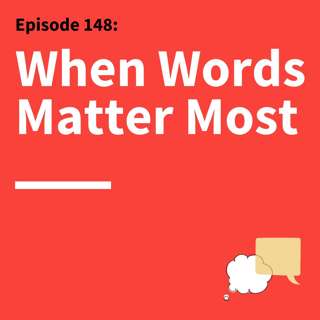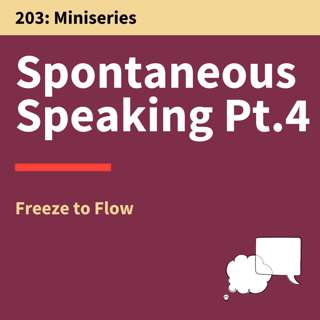
151. Get Hired: How the Right Communication Can Advance Your Career
Whether winning over a hiring manager or winning new business, career success often hinges on how we communicate. That’s why Andrew Seaman is on a mission to help people find the words that work — to get work.Seaman is the senior managing editor for jobs and career development at LinkedIn, and as the creator and host of the Get Hired podcast and newsletter, he helps millions hone communication skills to land the jobs they want. According to him, getting opportunities isn’t just about experience or connections, but how we frame and present our personal and professional narratives. With a standard resume, he says, “You're making them connect the dots. And people are not good at that.” Instead, he recommends crafting a story that explains where you’ve been, where you are, and where you hope to go. “Connect the dots for them,” he says, “so they're not viewing you as a person who has bounced around. They're thinking, this person has had a cohesive career.”In this episode of Think Fast, Talk Smart, Seaman and host Matt Abrahams explore tools for navigating the interview process, networking on and offline, and communication strategies to get hired.Episode Reference Links:Andrew SeamanAndrew’s Podcast: Get HiredEp.118 Maximizing Your Brand: Communicating Who You Are to Help Get What You Want Ep.147 Disrupt Yourself: How to Innovate Who You Are and Become Who You Can BeEp.62 Best Of: Summer Learning Series, How Humor Can Be a Secret Weapon in CommunicationConnect:Premium Signup >>>> Think Fast Talk Smart PremiumEmail Questions & Feedback >>> hello@fastersmarter.ioEpisode Transcripts >>> Think Fast Talk Smart WebsiteNewsletter Signup + English Language Learning >>> FasterSmarter.ioThink Fast Talk Smart >>> LinkedIn, Instagram, YouTubeMatt Abrahams >>> LinkedInChapters:(00:00) - Introduction (00:57) - Importance of Online Presence (01:52) - Posting on LinkedIn (05:29) - Commenting vs. Posting (07:00) - Interview Presence (08:47) - Recovering from Bad Impressions (09:36) - Interviewing from the Interviewer's Perspective (12:13) - Challenging Interview Questions (13:32) - Best Practices for Interviewees (15:46) - Handling Spontaneity in Interviews (19:05) - Following Up After Interviews (21:31) - Broader Career Advice (24:02) - The Final Three Questions (29:02) - Conclusion
16 Juli 202431min

150. Communication Tips from the Classroom and Around the World
Sometimes, what’s communicated to us can have a big impact on how we communicate to others. This episode explores some of the best communication advice — from experts and Think Fast, Talk Smart listeners around the world.As teachers of Strategic Communication, lecturers Shawon Jackson and Matt Abrahams have plenty of advice on how to be a better communicator. But in this 150th episode of Think Fast, Talk Smart, the two don’t just discuss the communication strategies they share with students in their class, they also feature communication advice from listeners of the podcast.Covering topics like knowing your audience, using transitions to tie together different ideas, and embracing the power of silence, Jackson and Abrahams unpack good advice for good communication in this celebratory episode of Think Fast, Talk Smart.Episode Reference Links:Shawon Jackson Shawon’s Educational Program: Vocal JusticeConnect:Premium Signup >>>> Think Fast Talk Smart PremiumEmail Questions & Feedback >>> hello@fastersmarter.ioEpisode Transcripts >>> Think Fast Talk Smart WebsiteNewsletter Signup + English Language Learning >>> FasterSmarter.ioThink Fast Talk Smart >>> LinkedIn, Instagram, YouTubeMatt Abrahams >>> LinkedIn
9 Juli 202423min

149. Rethinks: How to Take Risks in Your Communication, Relationships, and Career
“What people regret over time are things they didn’t do. They didn’t take that trip, they didn’t ask that person out on a date. They didn’t start that business,” says former political speechwriter and author Dan Pink. “I think it’s because we are slightly over-indexed on risk. We overstate the risk in many circumstances.”In this episode of Think Fast, Talk Smart, strategic communications lecturer Matt Abrahams sits down with Pink to hear how we can take more risks and how leaders can inspire others by focusing on the why instead of the how. “There’s almost incontrovertible evidence that a sense of purpose is the most cost-effective performance enhancer that organizations have,” Pink says.Episode Reference Links:Dan PinkDan's Book: The Power of Regret, DriveOriginal Episode: Ep.92 No Regrets: How to Take Risks in Your Communication, Relationships, and CareerEp.103 Simple Is a Superpower: How to Communicate Any Idea to Any AudienceEp.80 Magic Words: Change What You Say to Inspire and Influence OthersConnect:Premium Signup >>>> Think Fast Talk Smart PremiumEmail Questions & Feedback >>> hello@fastersmarter.ioEpisode Transcripts >>> Think Fast Talk Smart WebsiteNewsletter Signup + English Language Learning >>> FasterSmarter.ioThink Fast Talk Smart >>> LinkedIn, Instagram, YouTubeMatt Abrahams >>> LinkedIn
2 Juli 202427min

148. Conviction and Compassion: How to Have Hard Conversations
In our personal and professional lives, some conversations are harder than others. To navigate the difficulties of discussing what matters most, Professor Irv Grousbeck says we need the right balance of conviction and compassion.At both Stanford Graduate School of Business and Stanford School of Medicine, Grousbeck teaches courses on managing difficult conversations. He equips students with skills to be direct while being respectful, to be strong while being warm, and to resist any urge to beat around the bush. "Directness, with respect, is essential,” he says. "So many of our students feel that if you're direct with someone, somehow that's harsh. The art of good conversation management, I think, does involve directness and respect at the same time."In this episode of Think Fast, Talk Smart, Grousbeck and host Matt Abrahams explore practical tips and strategies for navigating difficult conversations, from the importance of listening and pausing, to the value of rehearsing your words in advance.Episode Reference Links:Irv GrousbeckIrv’s Book: New Business Ventures and the Entrepreneur Center for Entrepreneurial Studies | Stanford Graduate School of BusinessConnect:Premium Signup >>>> Think Fast Talk Smart PremiumEmail Questions & Feedback >>> hello@fastersmarter.ioEpisode Transcripts >>> Think Fast Talk Smart WebsiteNewsletter Signup + English Language Learning >>> FasterSmarter.ioThink Fast Talk Smart >>> LinkedIn, Instagram, YouTubeMatt Abrahams >>> LinkedIn
25 Juni 202431min

147. Disrupt Yourself: How to Innovate Who You Are and Become Who You Can Be
Innovation and disruption aren’t just for organizations. According to Whitney Johnson, we can find new possibilities for personal and professional growth — by disrupting ourselves.As an executive coach, author, and podcaster, Johnson teaches people how to level up their lives and careers through the power of personal disruption. Her book, Disrupt Yourself: Putting the Power of Disruptive Innovation to Work, reveals how shaking things up enables us to break free of the constraints we might not even know we’re imposing on ourselves. “Personal disruption [is] a process of deliberate self-innovation; a decision to step back from who you are to slingshot into who you can be,” she explains.In this Think Fast, Talk Smart episode with host Matt Abrahams, Johnson offers strategies for tailoring messages to different audiences, reveals the key ingredients for successful communication, and explains how disrupting yourself can open new doors and help you reach your full potential.Episode Reference Links:Whitney JohnsonWhitney’s Book: Disrupt Yourself: Putting the Power of Disruptive Innovation to WorkWhitney’s Podcast: Disrupt Yourself Podcast Ep.118 Maximizing Your Personal Brand: Communicating Who You Are to Help Get What You WantEp.138 Speak Your Truth: Why Authenticity Leads to Better CommunicationConnect:Premium Signup >>>> Think Fast Talk Smart PremiumEmail Questions & Feedback >>> hello@fastersmarter.ioEpisode Transcripts >>> Think Fast Talk Smart WebsiteNewsletter Signup + English Language Learning >>> FasterSmarter.ioThink Fast Talk Smart >>> LinkedIn, Instagram, YouTubeMatt Abrahams >>> LinkedIn
18 Juni 202428min

146. Stress Resets: How to Change Your Internal Dialogue to Communicate Better
Stress can get in the way of our communication with others. To manage our stress, psychologist Jenny Taitz says, we first need to adjust the conversations that we have with ourselves.Taitz is an assistant clinical professor in psychiatry at the University of California, Los Angeles, and the author of several books, including Stress Resets: How to Soothe Your Body and Mind in Minutes. According to her, much of the stress we experience is self-created through negative thought patterns and harsh self-criticism. “We're doing this to ourselves all the time,” she says. But as we become aware of these unhelpful mental loops, Taitz’ “resets” can help us disrupt them and reframe self-talk in more productive waysIn addition to changing our self-talk, Taitz offers tools for refreshing our communication with others. In this episode of Think Fast, Talk Smart, she and host Matt Abrahams explore her G.I.V.E. framework — how being gentle, interested, validating, and easy-mannered equips us for more positive conversations with ourselves and othersEpisode Reference Links:Jenny TaitzJenny’s Book: Stress Resets Ep.69 Feeling Nervous? How Anxiety Can Fuel Better CommunicationEp.122 How To Be More Confident and Calm in Your Communication: Managing the "ABC’s" of Communication Anxiety Connect:Premium Signup >>>> Think Fast Talk Smart PremiumEmail Questions & Feedback >>> hello@fastersmarter.ioEpisode Transcripts >>> Think Fast Talk Smart WebsiteNewsletter Signup + English Language Learning >>> FasterSmarter.ioThink Fast Talk Smart >>> LinkedIn, Instagram, YouTubeMatt Abrahams >>> LinkedIn
11 Juni 202423min

145. Rethinks: The Art of Negotiation, How to Get More of What You Want
Whether we realize it or not, we negotiate everyday. But when we approach these situations as a win-or-lose battle, we’re already showing resistance, and setting ourselves up for difficulty. But what if you reframed the whole idea, to think of a negotiation not as a fight, but as a problem-solving exercise involving emotions?In this episode of Think Fast, Talk Smart, Matt Abrahams speaks with Stanford GSB Professor Emeritus Margaret Neale about what she has learned in her decades of researching negotiation and the steps that lead to more collaborative problem-solving. Listen as Neale shares tips on how to approach negotiations with intention, and what strategies can help us more easily communicate our wants and needs. She is the coauthor of Getting (More of) What You Want: How the Secrets of Economics and Psychology Can Help You Negotiate Anything, in Business and in Life.Episode Reference Links:Margaret Ann Neale Margaret's Book: Getting (More of) What You WantOriginal Episode: Ep.15 The Art of Negotiation: How to Get More of What You WantConnect:Premium Signup >>>> Think Fast Talk Smart PremiumEmail Questions & Feedback >>> hello@fastersmarter.ioEpisode Transcripts >>> Think Fast Talk Smart WebsiteNewsletter Signup + English Language Learning >>> FasterSmarter.ioThink Fast Talk Smart >>> LinkedIn, Instagram, YouTubeMatt Abrahams >>> LinkedIn
4 Juni 202416min

144. Communicating Through Conflict: How to Get Along with Anyone
Many of us would rank getting along with colleagues as an important aspect of work, but, as Amy Gallo explains, relationships devoid of disagreement can actually be less productive. “While our natural human instinct is to avoid conflict, I believe that conflicts are not only an inevitable part of interacting with other humans, but they're a necessary part.”Gallo is a workplace expert, host of HBR’s Women at Work podcast, and the author of Getting Along: How to Work With Anyone. Across her work, Gallo touts that the key to transforming conflicts into something productive is to understand its root cause and learn how to reframe them. “Even at the base of those unhealthy conflicts or those unproductive conflicts is something that needs to be resolved,” she says. In her conversation with host and strategic communications lecturer Matt Abrahams, Gallo provides useful frameworks and new concepts on how we can approach conflicts at work. Episode Reference Links:Amy GalloAmy Gallo’s Book: Getting Along: How to Work With AnyoneAmy Gallo’s Podcast: Women at WorkEp.132 Lean Into Failure: How to Make Mistakes That WorkConnect:Premium Signup >>>> Think Fast Talk Smart PremiumEmail Questions & Feedback >>> hello@fastersmarter.ioEpisode Transcripts >>> Think Fast Talk Smart WebsiteNewsletter Signup + English Language Learning >>> FasterSmarter.ioThink Fast Talk Smart >>> LinkedIn, Instagram, YouTubeMatt Abrahams >>> LinkedIn
28 Maj 202425min






















